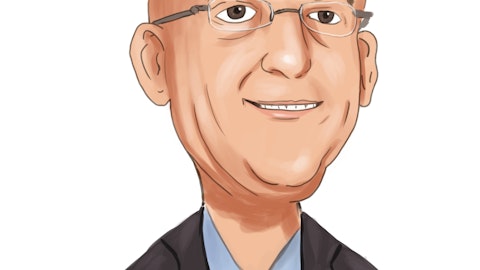I think I’ve seen some of the companies announce that they’re starting to maybe build inventories a little bit. I think it’s still too early to know if that’s a trend that you’re going to see throughout the industry. But, maybe at a minimum, maybe the destocking is kind of hit its bottom, that’s certainly our hope that destocking hit its bottom and we’ll start to see inventories start to build a little bit. Most of our customers that we talk to think that the first half of next year is still going to be kind of sluggish, and their hope is that the second half of the year is going to — is going to improve. Many of them are sitting on a lot of money. They’ve made a lot of money in the last few years and frankly, many of them have equipment that’s — it’s run harder — they ran it very hard the last few years to meet demand and they really need to make some investments, but they’re just waiting to see kind of when the economy starts to turn and industries start to drop.
So that’s kind of the — what we’re currently operating under is the belief that things will probably start out slowly next year and with a little hope will start to improve as the year goes on, certainly in the back half of the year.
Aditya Madan: Great. Yeah, that’s good to hear. So, as a follow-up, has the tone in your conversations with customers changed much relative to last quarter and have there been any additional indications regarding customers potentially looking to push out or extend timelines on capital projects?
Jeffrey Powell: Well, that’s normally what happens. I think we normally say on most calls that it’s unusual for projects to be canceled — terminated forever, they just get delayed. And I would say, in all the discussions we’ve had — with our customers, and there’s actually a fair amount that — of that that occurs once summer is over we kind of — there is trade shows, industry shows and so we get an opportunity to spend more time with our customers and get a sense of their current thinking. And I would say what we’re generally hearing, as I mentioned earlier is, well, we’ve got the cash to make investments, we have some older equipment that we know we need to make some investments in, but we just want to just get a little better sense of where we are in this economic cycle.
Have we bottomed out, is there a recession still to occur and what’s going to go on with interest rates? So they are all taking a wait-and-see attitude. But obviously, every quarter that goes by without a downturn or without a technical recession and interest and inflation continues to moderate, I think they are — they become more and more hopeful that we’re going to get through this without a true recession and things will start to turn around. But it’s — right now, it’s a very challenging time. We’ll see what their Chairman Powell says today, I think.
Aditya Madan: Yeah, I think we all are looking forward to that. So let’s see what he has to say. And just lastly on capital allocation, just — I’m just curious on the M&A pipeline and how you’re thinking about M&A versus share repurchases.
Jeffrey Powell: So I mentioned I think through the last couple of quarters that our corporate development group is probably as busy as they’ve been in many years. There was clearly a slow period kind of during the pandemic and after the pandemic. But this year things have been very, very active and, of course, our balance sheet is in very, very good shape. So we’re well positioned to pursue these opportunities. And we’re hopeful that we’re going to find some good fits for the organization, but there is a fair amount of discussions and activities and opportunities out there in the marketplace right now. As far as stock buyback, we haven’t done that for many years. We only have found that we can create — we create more value if we can find good opportunities to bring companies into [Technical Difficulty] into the Kadant family.


